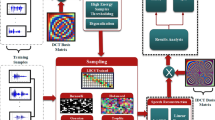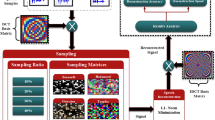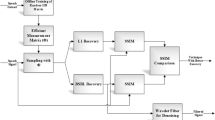Abstract
In order to collect a large number of speech signals from patients with speech disorders in real environment under the background of big data, this paper adopts compressed sensing(CS) theory and replaces Nyquist sampling theorem with sparse model. Based on the traditional CS theory, an optimized Hadamard matrix is proposed to perform incoherent measurement on the patient’s speech signal. Some blocks in the measurement matrix are subjected to Hadamard transformation and the columns are randomly exchanged, so that the elements in the matrix obey the zero mean and Normal distribution of variance. The experiment uses the speech signals of speech-impaired patients as samples, selects a subspace tracking algorithm with good reconstruction probability and guarantees, and compares the reconstruction effects of different measurement matrices. The experimental results show that the selected patient voice signals are run 1000 times respectively. Compared with the other five matrices, the optimized Hadamard matrix studied in this paper has the highest signal-to-noise ratio, the best reconstruction effect, and shorter running time.
Access this chapter
Tax calculation will be finalised at checkout
Purchases are for personal use only
Similar content being viewed by others
References
Candés, E., Romberg, J., Tao, T.: Robust uncertainty principles: exact signal reconstruction from highly incomplete frequency information. IEEE Trans. Inf. Theory 52(2), 489–509 (2006)
Candes, E.J., Romberg, J.K., Tao, T.: Stable signal recovery from incomplete and inaccurate measurements. Commun. Pure Appl. Math. 59(8), 1207–1223 (2006)
Zhang, Y., Li, J., Zhang, M.: Reverberation multi-source localization algorithm based on compressed sensing with dual microphones. J. Commun. 40(1), 102–109 (2019)
Metzler, C.A., Maleki, A., Baraniuk, R.G.: From denoising to compressed sensing. IEEE Trans. Inf. Theory 62(9), 5117–5144 (2016)
Voroninski, V., Xu, Z.: A strong restricted isometry property, with an application to phaseless compressed sensing. Appl. Comput. Harm. Anal. 40(2), 386–395 (2016)
Tillmann, A.M., Pfetsch, M.E.: The computational complexity of the restricted isometry property, the nullspace property, and related concepts in compressed sensing. IEEE Trans. Inf. Theory 60(2), 1248–1259 (2014)
Ma, R., Pei, L., Jiang, H.: Improved optimization algorithm for measurement matrix in compressed sensing. J. Signal Process. 33(2), 192–197 (2017)
Malloy, M.L., Nowak, R.D.: Near-optimal adaptive compressed sensing. IEEE Trans. Inf. Theory 60(7), 4001–4012 (2014)
Do, T.T., Tran, T.D., Gan, L.: Fast compressive sampling with structurally random matrices. In: Proceedings of ICASSP, pp. 3369–3372 (2008)
Lustig, M., Donoho, D., Santos, J., Pauly, J.: Compressed sensing MRI. IEEE Signal Process. Mag. 25(2), 1182–1195 (2008)
Du, M., Zhao, H.C., Zhao, C.Y.: An anti-interfering reconstruction algorithm of image compression based on compressed sensing. J. Optoelectron. Laser 25(5), 1009–1015 (2014)
Wang, T.J., Li, X.Q., Bai, G.W., et al.: Multi-target localization algorithm based on adaptive grid in wireless sensor network. J. Commun. 40(7), 197–207 (2019)
Zhang, R., Li, S.: Optimal RIP bounds for sparse signals recovery via l p minimization. Appl. Comput. Harm. Anal. (2017). Accessed 18 Oct 2017. https://doi.org/10.1016/j.acha.2017.10.004
Acknowledge
This Research work was supported in part by the Open Research Fund of National Engineering Research Center for Agro-Ecological Big Data Analysis & Application, Anhui University (Grant No. AE201906), in part by the Humanities and Social Science Fundation of the Higher Education Institutions of Anhui Province, China (Grant No. SK2019A0243), in part by the Natural Science Fundation of the Higher Education Institutions of Anhui Province, China (Grant No. KJ2018A0285), in part by the Teaching Research Fundation of the Higher Education Institutions of Anhui Province, China (Grant No. 2018jyxm0940)
Author information
Authors and Affiliations
Corresponding author
Editor information
Editors and Affiliations
Rights and permissions
Copyright information
© 2021 The Editor(s) (if applicable) and The Author(s), under exclusive license to Springer Nature Switzerland AG
About this paper
Cite this paper
Ma, C., Li, F. (2021). Research on Speech Reconstruction Algorithm for Speech Disorder Patients Based on Compressed Sensing. In: Abawajy, J., Choo, KK., Xu, Z., Atiquzzaman, M. (eds) 2020 International Conference on Applications and Techniques in Cyber Intelligence. ATCI 2020. Advances in Intelligent Systems and Computing, vol 1244. Springer, Cham. https://doi.org/10.1007/978-3-030-53980-1_137
Download citation
DOI: https://doi.org/10.1007/978-3-030-53980-1_137
Published:
Publisher Name: Springer, Cham
Print ISBN: 978-3-030-53979-5
Online ISBN: 978-3-030-53980-1
eBook Packages: Intelligent Technologies and RoboticsIntelligent Technologies and Robotics (R0)




